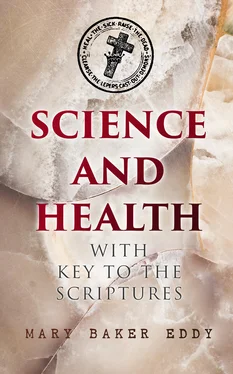The power of will should be exercised only by the higher faculties, and curbed by the sentiments, or it will hold the reins, misguide the judgment, and let loose the lower propensities. To guard and govern thought is the province of the higher faculties, acting upon the body beneficially.
Will-power is capable of all evil. It can never heal the sick, for it is the prayer of the unrighteous; while the exercise of the higher sentiments — hope, faith, joy — is the prayer of the righteous. This prayer, governed by Science instead of sense, heals the sick.
Mozart and Beethoven experienced more than they expressed. The rapture of their grandest symphonies was never heard. They were musicians before the world knew it. Mental melodies, and strains of sweetest music, precede notes, or conscious sound.
Music is the rhythm of head and heart. Mortal mind is the harp of many strings, discoursing either harmony or discord, as the hand that sweeps over it is human or divine.
Whatsoever inspires with Wisdom, Truth, or Love — be it song, sermon, or Science — blesses the human family with crumbs of comfort that fall from the Master's table, feeding the hungry and giving living waters to the thirsty. Spiritual draughts are healing, while material lotions interfere with Truth, even as ritualism and creed hamper the Spirit. If we trust one we distrust the other.
Physics act against metaphysics, and vice versa . When mortals leave the lower for the higher basis of action, medicine loses its power to heal. It has no innate power. Unsupported by the faith of illusion, it becomes powerless.
Mortal mind conceives of the liquid or the solid, and then classifies its thoughts materially. Their immortal and spiritual facts exist above and beyond this mortal and material belief. Good is self-existent and self-expressed, though indefinable as a whole, and every step towards goodness is a departure from the material basis and a tendency toward Spirit. Material theories, creeds, and codes partially paralyze this attraction toward Spirit — the infinite, harmonious, and eternal — by an opposite attraction towards the personal, finite, temporary, and discordant.
Footsteps of progress and spiritualization greet us on every hand. Systems of drugging are losing their hold on matter, and so letting in the higher stratum of mortal mind. Homœopathy, a step in advance of allopathy, is doing this. Matter is going out of medicine, and mortal mind — of a higher attenuation than the drug — comes into the pellets.
Metaphysics, as in Christian Science, is the next stately step beyond homœopathy. There matter disappears from the remedy, and Mind takes its rightful place. Homœopathy takes mental symptoms largely into consideration in the diagnosis of disease. Science deals wholly with the mental cause, in judging and destroying disease. It succeeds where homœopathy fails, solely because the principle of healing is Mind, and the whole force of the mental element is employed in the Science of Mind, never sharing its rights with weaker matter.
The human mind acts the more powerfully to offset the discords of matter (the ills of flesh) in proportion as it puts less weight into the material scale and against Spirit, — against its own interests. Homœopathy diminishes the drug. Its potency increases as the drug disappears.
Metaphysics, as in Christian Science, exterminates the drug, and employs Mind alone as the curative Principle, — this Divine Mind having all power. The pharmacy of homœopathy mentalizes a drug with such high attenuation of belief that it becomes more like mortal mind than its substratum, matter, and its power to heal is proportionately increased.
As the crude footprints of the past lose themselves in the dissolving paths of the present, we should understand the Science that governs these results, and plant our footsteps on firmer ground. Every so-called pleasure of sense gains a higher or lower definition, with the lapse of time. This unfolding should be painless progress, attended by love and peace, instead of envy and pride.
We should unclasp our beliefs gently, become more familiar with health than sickness, and never admit a thought of discord. We should dismiss those unpleasant guests — sin, sickness, and death — from mortal mind, in order to guard the body from them as watchfully as we bar our doors against the approach of thieves and murderers.
If proper ward were kept over the human mind, the lazar-house, the dismal cell, and the slaughter-house of infamy would be emptied. We must begin with mortal mind, and empty that of crime, or crime will never cease. Criminal codes are inadequate to educate the moral thought.
A mother is the strongest educator, either for or against crime. Her thoughts form the embryo of another mortal mind, and make it perchance after a model unknown to herself, “according to the pattern shown in the mount;” or perhaps diviner influences raise it higher. Hence the importance of Christian Science, wherefrom we learn the One Mind, the availability of good, and the remedy for every woe.
The world would collapse without the Intelligence that holds the winds in His grasp. Neither philosophy nor scepticism can efface the Science that reveals Mind through its wondrous works. The immortal sense of His power enhances it. Nearness, not distance, lends enchantment to this view.
That instinct is better than misguided reason, even inanimate nature declares. The violet lifts her blue eye to greet the early spring. The leaves clap their hands as Nature's untired worshippers. The snowbird sings and soars amid the blasts, has no catarrh from wetting his feet, procures his summer residence with more ease than a nabob.
The atmosphere of earth, more kind, leaves catarrh to the atmosphere of mortal mind. Nothing but mortal belief gives colds and coughs, or circulates contagion. Mortal mind produces its own phenomena, and then charges them to something else; like a kitten glancing into the mirror at herself, and thinking she sees there another kitten.
Nerves are not the source of pain or pleasure. We suffer or enjoy in our dreams, but this pain or pleasure is not communicated through a nerve. A tooth extracted sometimes aches again in belief, and the pain seems in its old position. A limb amputated has continued in belief to pain the owner. If the sensation of pain in the limb can return, and be prolonged, why could not the limb reappear?
Why need pain come sooner than pleasure to this mortal sense? Because the memory of it is more vivid. I have seen an unwitting attempt to scratch the end of a finger which had been cut off for months. When the nerve is gone that we say occasioned pain, and yet the pain remains, it proves sensation to be in the human mind, not in matter. Reverse the case, take away this mind instead of a piece of the flesh, and then nerves have no sensation.
When the sick recover by the use of drugs, it is the law of a general belief, culminating in individual faith, that heals, and according to this faith will the effect be. Take away the individual confidence in the drug, and you have not yet divorced it from the general faith. The chemist, the botanist, the druggist, the doctor, the nurse, equip the medicine with their faith, and the majority of beliefs do rule. When the general belief endorses the inanimate drug as doing this or that, individual dissent or faith is but a minority belief, governed by the majority.
The quotient, proving that numbers have been divided by a fixed rule, is not more unquestionable than the scientific tests I have made of the effects of Truth upon the sick. The counter-fact, relative to any disease, is required to cure it. The counteracting argument of Truth is designed to rebuke and destroy sin. Why should Truth not be equally efficient in sickness, which is a result of sin?
Читать дальше












